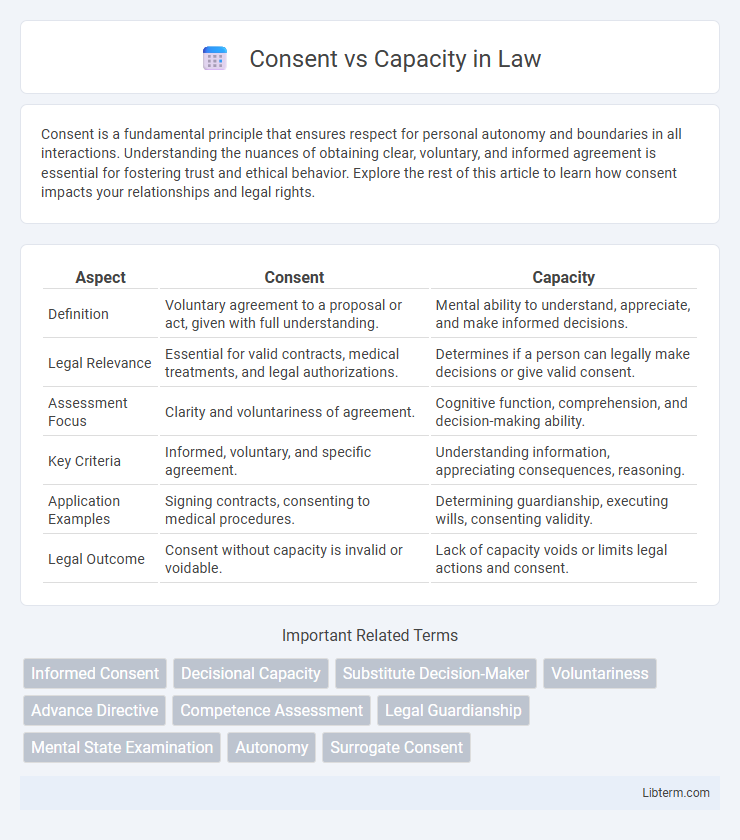Consent is a fundamental principle that ensures respect for personal autonomy and boundaries in all interactions. Understanding the nuances of obtaining clear, voluntary, and informed agreement is essential for fostering trust and ethical behavior. Explore the rest of this article to learn how consent impacts your relationships and legal rights.
Table of Comparison
| Aspect | Consent | Capacity |
|---|---|---|
| Definition | Voluntary agreement to a proposal or act, given with full understanding. | Mental ability to understand, appreciate, and make informed decisions. |
| Legal Relevance | Essential for valid contracts, medical treatments, and legal authorizations. | Determines if a person can legally make decisions or give valid consent. |
| Assessment Focus | Clarity and voluntariness of agreement. | Cognitive function, comprehension, and decision-making ability. |
| Key Criteria | Informed, voluntary, and specific agreement. | Understanding information, appreciating consequences, reasoning. |
| Application Examples | Signing contracts, consenting to medical procedures. | Determining guardianship, executing wills, consenting validity. |
| Legal Outcome | Consent without capacity is invalid or voidable. | Lack of capacity voids or limits legal actions and consent. |
Introduction to Consent and Capacity
Consent involves the voluntary agreement to a proposed action or treatment, requiring clear communication and understanding from the individual. Capacity refers to the mental ability to comprehend information, evaluate options, and make informed decisions, often assessed through legal and medical standards. Distinguishing consent from capacity is critical in healthcare and legal settings to ensure that individuals' rights and autonomy are respected while providing appropriate support when decision-making abilities are impaired.
Defining Consent in Healthcare
Consent in healthcare refers to a patient's voluntary agreement to undergo a medical intervention after being fully informed about the risks, benefits, and alternatives. It requires clear communication to ensure the patient comprehends the information and makes an informed decision. Valid consent must be given by an individual with the capacity to understand and evaluate the medical information relevant to the treatment.
Understanding Capacity: What Does It Mean?
Understanding capacity refers to an individual's ability to comprehend information relevant to a specific decision, weigh the options, and communicate their choice effectively. Capacity is decision-specific and may fluctuate over time, influenced by cognitive function, mental health, and situational factors. Proper assessment of capacity involves evaluating comprehension, reasoning, appreciation of consequences, and communication skills to ensure informed consent is valid.
Legal Frameworks Governing Consent and Capacity
Legal frameworks governing consent and capacity establish clear criteria to assess an individual's ability to make informed decisions, ensuring protection of personal autonomy while preventing exploitation. These frameworks vary by jurisdiction but commonly require that consent be given voluntarily, with sufficient understanding and without coercion, while capacity is evaluated through cognitive and decisional abilities, often supported by medical or psychological assessments. Statutes such as the Mental Capacity Act 2005 in the UK and the Patient Self-Determination Act in the US provide structured guidance on determining capacity and obtaining valid consent for medical treatment and other personal decisions.
Key Differences Between Consent and Capacity
Consent refers to an individual's voluntary agreement to a specific action or decision, indicating their willingness to participate or permit, while capacity is the cognitive and legal ability to understand information, weigh options, and make informed decisions. Key differences include that consent is action-specific and can fluctuate, whereas capacity is decision-specific and assessed based on mental competence at a given time. Legal frameworks often require capacity to be established before valid consent can be recognized, highlighting the relationship but distinct nature of these concepts.
Assessing Patient Capacity: Core Principles
Assessing patient capacity involves evaluating cognitive ability, understanding, and decision-making skills specific to the medical context. Core principles include determining the patient's ability to comprehend relevant information, appreciate the consequences of decisions, and communicate choices consistently. This assessment is crucial for ensuring valid informed consent and respecting patient autonomy within ethical and legal frameworks.
When Consent Is Not Valid: Common Scenarios
Consent is not valid when an individual lacks legal capacity due to age, mental impairment, or coercion. In medical and legal contexts, consent obtained under duress, misinformation, or from minors typically holds no legal standing. Valid consent requires clear understanding and voluntary agreement, ensuring the individual is competent to decide.
Ethical Considerations in Consent and Capacity
Ethical considerations in consent and capacity emphasize respecting patient autonomy while ensuring informed and voluntary decision-making. Healthcare providers must assess capacity accurately to avoid coercion and protect vulnerable individuals from harm. Balancing beneficence with respect for autonomy requires clear communication and ongoing consent evaluation in clinical practice.
Role of Healthcare Professionals in Safeguarding Rights
Healthcare professionals play a critical role in assessing a patient's capacity to consent to treatment, ensuring decisions are made voluntarily and based on adequate understanding. By accurately evaluating cognitive and emotional ability, they safeguard patients' legal and ethical rights while promoting autonomy. Proper documentation and adherence to regulatory standards further protect vulnerable individuals from exploitation or harm.
Conclusion: Ensuring Respect for Autonomy and Dignity
Respecting autonomy and dignity requires a clear distinction between consent and capacity, ensuring individuals make informed decisions when capable. Legal frameworks and ethical guidelines must align to support assessment of mental capacity accurately, promoting valid consent processes. Protecting autonomy involves continuous evaluation and support, enabling individuals to participate in decisions affecting their well-being fully.
Consent Infographic

 libterm.com
libterm.com